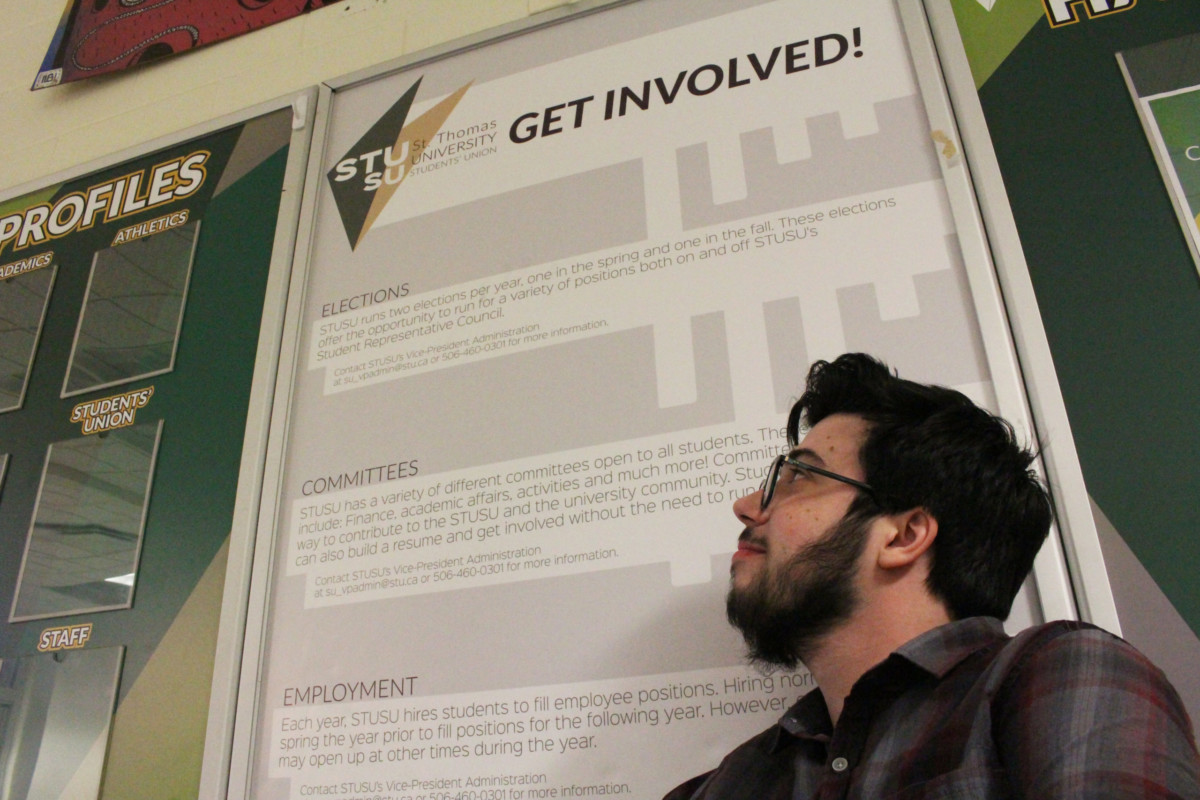St. Thomas University student Alex Gagne couldn’t stop thinking about the union’s transparency and accountability after he attended the STU Students’ Union executive candidates’ debates on Feb. 25 and 26.
At every debate, the topics were discussed, or they were already in the candidates’ campaign platforms. Gagne, the third-year political science honours student and Great Books major student, said it’s a sign the status quo is not enough.
“There’s clearly a demand for more.”
He now plans to form a student advocacy group similar to the model of a government opposition party. He said it’s an effective tool to check and challenge the policies and won’t necessarily always be negative.
“It’s really focusing on why a policy is developed the way it is, and then focus on approving it.”
An issue of initiative
STUSU president Husoni Raymond said the issue of accountability and transparency isn’t an issue at all, but an issue of initiative on students’ part.
“The only way everyone will be satisfied is if everyone takes the initiative to seek out information … The information is there … It’s literally two clicks away.”
He said there’s not a need for what Gagne is proposing. The STUSU already releases monthly reports over the summer, presents weekly reports to the Student Representative Council, publishes their meeting minutes, publishes email newsletter, publishes monthly video updates and has an anonymous feedback option at the Help Desk or on their website. In addition, any student can come to the SRC meetings. The Aquinian also publishes a summary of the SRC meetings called Weekly Briefs.
The Board of Governors meetings are confidential and senate meetings are public, except for when they go in-camera.
Raymond said it’s important to have and listen to diverse voices but that’s why the SRC exists.
“We have the different reps that bring the perspectives of the various constituencies that they represent so it’s not just the executives making decision, but we have the voice of everyone around the table.”
“The elected representatives are not afraid to ask questions.”
He’s also concerned the new society might create a culture of intimidation and bullying.
“But if students want to do it, then that’s supposedly within their prerogative.”
The group’s purpose
Gagne said the group, composed of volunteers and elected roles, will have three purposes: critiquing, gathering information and consultation.
To critique, the advocacy group would host public debates where students would have the opportunity to discuss STUSU policies. STUSU members would be invited to the debate and talk, defend and access their policy measures.
To gather information and consult, the elected officials will consult and survey students. Gagne said with his representatives on the ground, more people will be able to learn information about STUSU initiatives and have their voices heard.
Elected critics assigned to each executive STUSU role, such as vice-president student life, would focus on bringing information out to the student body on STUSU policy and initiatives and consulting students on them.
Gagne said the STUSU alone can only consult so much with the time and numbers they have.
“So this is where this advocacy group comes into play. It’s going to conduct on-the-ground polling with student volunteers, talking to fellow students on how they feel about policy measures, and talking about policy and the mission of this student union.”
Unions’ role
It appears that Gagne’s proposed group would be one of the first of its kind in Canadian universities.
Laura Levick, an assistant professor in STU’s political science department, said it’s important to take into consideration that unions might be subject to different rules and operating procedures than a government body.
“Especially relating to member obligations, dues and reporting,” she said in an email.
The STUSU’s constitution and by-laws don’t mention an obligation of transparency or accountability. Neither does the University of New Brunswick Student Union’s constitution or bylaws. Mount Allison Student Union’s bylaws state, “All Officers of the MASU, including those named in Law 8, 9 and 10, shall be accountable for their conduct as appointed and representative members of the MASU in accordance with Operating Procedure 10 – Human Resources.” Operating procedure 10 refers to their Office of the Obumsperson.
Increased dialogue
The group is still in its early stages. Gagne said there are four people so far who want to contribute to the group.
The group doesn’t have a name yet and their first meeting is scheduled for this week. Gagne said he hopes to hold elections for the critic positions by the end of March.
“The best-case scenario is not having the students’ prime issue during the candidates debates being accountability and information and policies and transparency. Those questions are only there because there is a perceived need … The best-case scenario is to eliminate that need and fill it with satisfaction.”
“Universities have always been a hotbed of thought. And having the student body express their thoughts … I can’t see that as a bad thing.”

